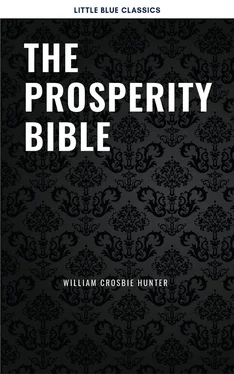22. Deliver an extemporaneous speech describing any dramatic scene in the style of "Midnight in London."
23. Describe an event in your favorite sport in the style of Dr. Talmage. Be careful to make the delivery effective.
24. Criticise, favorably or unfavorably, the descriptions of any travel talk you may have heard recently.
25. Deliver a brief original travel talk, as though you were showing pictures.
26. Recast the talk and deliver it "without pictures."
21
INFLUENCING BY NARRATION
The art of narration is the art of writing in hooks and eyes. The principle consists in making the appropriate thought follow the appropriate thought, the proper fact the proper fact; in first preparing the mind for what is to come, and then letting it come.
—Walter Bagehot,
Literary Studies .
Our very speech is curiously historical. Most men, you may observe, speak only to narrate; not in imparting what they have thought, which indeed were often a very small matter, but in exhibiting what they have undergone or seen, which is a quite unlimited one, do talkers dilate. Cut us off from Narrative, how would the stream of conversation, even among the wisest, languish into detached handfuls, and among the foolish utterly evaporate! Thus, as we do nothing but enact History, we say little but recite it.
—Thomas Carlyle,
On History .
Only a small segment of the great field of narration offers its resources to the public speaker, and that includes the anecdote, biographical facts, and the narration of events in general.
Narration—more easily defined than mastered—is the recital of an incident, or a group of facts and occurrences, in such a manner as to produce a desired effect.
The laws of narration are few, but its successful practise involves more of art than would at first appear—so much, indeed, that we cannot even touch upon its technique here, but must content ourselves with an examination of a few examples of narration as used in public speech.
In a preliminary way, notice how radically the public speaker's use of narrative differs from that of the story-writer in the more limited scope, absence of extended dialogue and character drawing, and freedom from elaboration of detail, which characterize platform narrative. On the other hand, there are several similarities of method: the frequent combination of narration with exposition, description, argumentation, and pleading; the care exercised in the arrangement of material so as to produce a strong effect at the close (climax); the very general practise of concealing the "point" (dénouement) of a story until the effective moment; and the careful suppression of needless, and therefore hurtful, details.
So we see that, whether for magazine or platform, the art of narration involves far more than the recital of annals; the succession of events recorded requires a plan in order to bring them out with real effect.
It will be noticed, too, that the literary style in platform narration is likely to be either less polished and more vigorously dramatic than in that intended for publication, or else more fervid and elevated in tone. In this latter respect, however, the best platform speaking of today differs from the models of the preceding generation, wherein a highly dignified, and sometimes pompous, style was thought the only fitting dress for a public deliverance. Great, noble and stirring as these older masters were in their lofty and impassioned eloquence, we are sometimes oppressed when we read their sounding periods for any great length of time—even allowing for all that we lose by missing the speaker's presence, voice, and fire. So let us model our platform narration, as our other forms of speech, upon the effective addresses of the moderns, without lessening our admiration for the older school.
The Anecdote
An anecdote is a short narrative of a single event, told as being striking enough to bring out a point. The keener the point, the more condensed the form, and the more suddenly the application strikes the hearer, the better the story.
To regard an anecdote as an illustration—an interpretive picture—will help to hold us to its true purpose, for a purposeless story is of all offenses on the platform the most asinine. A perfectly capital joke will fall flat when it is dragged in by the nape without evident bearing on the subject under discussion. On the other hand, an apposite anecdote has saved many a speech from failure.
"There is no finer opportunity for the display of tact than in the introduction of witty or humorous stories into a discourse. Wit is keen and like a rapier, piercing deeply, sometimes even to the heart. Humor is good-natured, and does not wound. Wit is founded upon the sudden discovery of an unsuspected relation existing between two ideas. Humor deals with things out of relation—with the incongruous. It was wit in Douglass Jerrold to retort upon the scowl of a stranger whose shoulder he had familiarly slapped, mistaking him for a friend: 'I beg your pardon, I thought I knew you—but I'm glad I don't.' It was humor in the Southern orator, John Wise, to liken the pleasure of spending an evening with a Puritan girl to that of sitting on a block of ice in winter, cracking hailstones between his teeth."
The foregoing quotation has been introduced chiefly to illustrate the first and simplest form of anecdote—the single sentence embodying a pungent saying.
Another simple form is that which conveys its meaning without need of "application," as the old preachers used to say. George Ade has quoted this one as the best joke he ever heard:
Two solemn-looking gentlemen were riding together in a railway carriage. One gentleman said to the other: "Is your wife entertaining this summer?" Whereupon the other gentleman replied: "Not very."
Other anecdotes need harnessing to the particular truth the speaker wishes to carry along in his talk. Sometimes the application is made before the story is told and the audience is prepared to make the comparison, point by point, as the illustration is told. Henry W. Grady used this method in one of the anecdotes he told while delivering his great extemporaneous address, "The New South."
Age does not endow all things with strength and virtue, nor are all new things to be despised. The shoemaker who put over his door, "John Smith's shop, founded 1760," was more than matched by his young rival across the street who hung out this sign: "Bill Jones. Established 1886. No old stock kept in this shop."
In two anecdotes, told also in "The New South," Mr. Grady illustrated another way of enforcing the application: in both instances he split the idea he wished to drive home, bringing in part before and part after the recital of the story. The fact that the speaker misquoted the words of Genesis in which the Ark is described did not seem to detract from the burlesque humor of the story.
I bespeak the utmost stretch of your courtesy tonight. I am not troubled about those from whom I come. You remember the man whose wife sent him to a neighbor with a pitcher of milk, who, tripping on the top step, fell, with such casual interruptions as the landings afforded, into the basement, and, while picking himself up, had the pleasure of hearing his wife call out:
"John, did you break the pitcher?
"No, I didn't," said John, "but I be dinged if I don't."
So, while those who call to me from behind may inspire me with energy, if not with courage, I ask an indulgent hearing from you. I beg that you will bring your full faith in American fairness and frankness to judgment upon what I shall say. There was an old preacher once who told some boys of the Bible lesson he was going to read in the morning. The boys, finding the place, glued together the connecting pages. The next morning he read on the bottom of one page: "When Noah was one hundred and twenty years old he took unto himself a wife, who was"—then turning the page—"one hundred and forty cubits long, forty cubits wide, built of gopher wood, and covered with pitch inside and out." He was naturally puzzled at this. He read it again, verified it, and then said, "My friends, this is the first time I ever met this in the Bible, but I accept it as an evidence of the assertion that we are fearfully and wonderfully made." If I could get you to hold such faith to-night, I could proceed cheerfully to the task I otherwise approach with a sense of consecration.
Читать дальше












